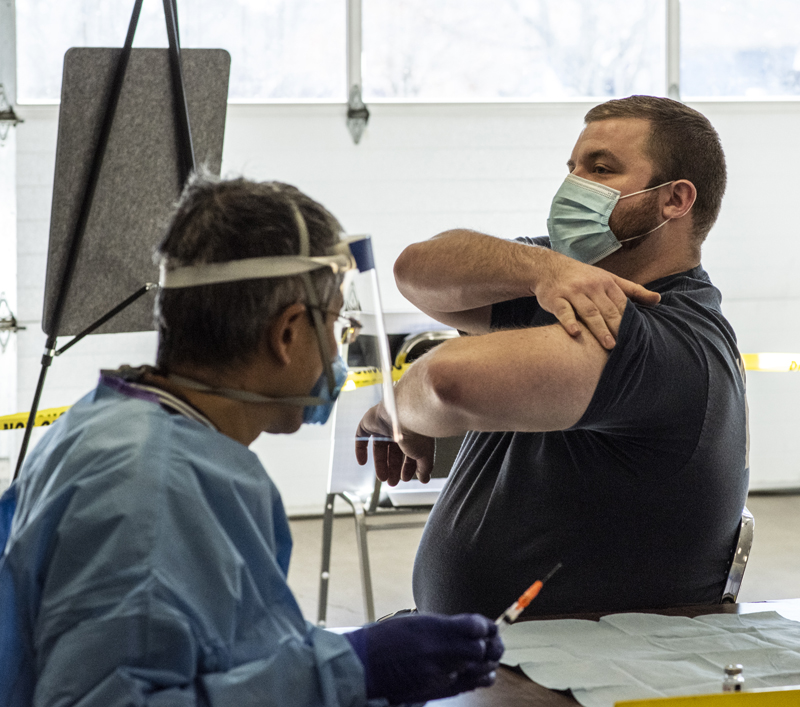
Central Lincoln County Ambulance Service Chief Nick Bryant rolls up his sleeve to receive a COVID-19 vaccine from Dr. James Li in Waldoboro on New Year’s Day. (Bisi Cameron Yee photo)
Fifty-two of Lincoln County’s ambulance staff and volunteer first responders received the first dose of the Moderna COVID-19 vaccine on New Year’s Day.
From 11 a.m. to 2 p.m., Waldoboro Emergency Medical Services Medical Director James Li and Deputy Director Derek Booker vaccinated emergency medical technicians and paramedics from Waldoboro EMS and from the Boothbay Region, Central Lincoln County, and Wiscasset ambulance services, as well as volunteer first responders from the area.
The vaccine doses were delivered by courier Friday morning. The doses were packaged in a Styrofoam-clad box with dry ice and stored in a refrigerator with temperature monitoring twice daily.
Vaccine recipients were asked to stay on-site for 15-30 minutes to ensure there were no negative responses to the vaccine. Li said they were prepared for the possibility of allergic reactions and that both Benadryl and epinephrine were available if necessary. Neither treatment was needed.
According to Li, the Maine Center for Disease Control and Prevention asked agencies to volunteer to host vaccination clinics about a month ago. Li said doses were allocated based on the county’s staffing levels, with Knox and Lincoln counties each qualifying for distribution at two agencies. Some spillover between counties was expected, as health care workers are often employed at multiple locations.
The Lincoln County vaccination clinics were in Waldoboro on New Year’s Day and in Boothbay the next day. Eligible employees and volunteers were encouraged to register in advance.
Some potential recipients needed time to “consider and think,” according to Li.
“I can’t tell you the sense of relief I had when I was giving the vaccine,” said Li, an emergency physician at LincolnHealth. “And when I got my own shot.”
“Once you’ve seen one case of polio, one case of COVID, all your anti-vaccine sentiment disappears. It’s very compelling to see firsthand,” Li said.
Most people being vaccinated at the Jan. 1 clinic are not in a high-risk age group. But EMS staff work with COVID-19 patients and risk exposure every day, as Waldoboro EMS Director Richard Lash pointed out.
The Waldoboro clinic gave out 52 vaccines and the Boothbay clinic gave out 44 vaccines for a total of 96 doses from nine vials in two days. Li said there was one vial remaining at Boothbay, which would bring the total number of vaccinated emergency workers to 106, as opposed to the expected 100. “If we can squeeze even one extra dose out of a vial, it’s a big deal,” Li said.
Li believes news coverage of adverse reactions is one factor inhibiting more widespread acceptance of the vaccine. But he said that coverage has often lacked context. A small percentage of vaccine recipients nationwide — less than 10 cases in the U.S., according to Li — have reported an anaphylactic reaction that necessitated immediate medical intervention. Li added that globally, there have been no deaths from anaphylactic shock caused by the vaccine.
Li said that the chance of dying from anaphylactic shock caused by the COVID-19 vaccine is on par with the chance of being struck by lightning and that the risk of dying from COVID-19 is “thousands of times higher” than the risk of dying from the vaccine.
Phase 1a of Maine’s vaccination rollout prioritized health care workers and nursing home residents and staff. Li said the state has distributed all the vaccines reserved for EMS, and if there are any remaining doses, they will be provided to nursing homes.
Phase 1b will include other emergency personnel, such as firefighters and police, as well as other essential workers. Li does not yet have information about the start date for that rollout. According to maine.gov, “These phases are subject to change, and the specific timeline for each vaccine phase depends on vaccine availability.”
In the Moderna studies for U.S. Food and Drug Administration approval, the drug company reported that the first dose confers 80-90% immunity within 14 days. Li is closely following the “very interesting mathematical model being used in the U.K.,” as that country experiments with using single doses of a similar two-dose vaccine that will confer slightly less immunity while vaccinating twice the number of people.
“I did not believe we would get to this point so quickly — only 330 days from the identification of COVID-19 in China to the ability to vaccinate against the virus,” Li said. Li called the achievement historic and unprecedented. “This type of vaccine is so high-tech,” he said.
Both Moderna and Pfizer have reported that their vaccines have been found to have up to 95% efficacy at achieving immunity from COVID-19. “We’ve never seen a vaccine in history with more than 90% efficacy — there is really good science behind this,” Li said.
Li compared the efficacy of the COVID-19 vaccine with the flu vaccine. According to Li, the flu vaccine only has 40-60% efficacy in a really good year. Even the AstraZeneca vaccine for COVID-19, which only has 70-80% efficacy, is more effective than the flu shot.
“The public health mission is to get people to reduce their risks proactively. Humans are very, very poor at proactive steps — we are primarily a reactive species,” Li said.
“We eradicated smallpox. We have almost eradicated polio. We can eradicate COVID-19,” Li said.
Maine has already allocated the second dose of the Moderna vaccine for the EMS workers who received the initial dose on New Year’s Day. Recipients will return to the vaccination clinic for their next dose in four weeks, on Jan. 29.
“This is the elixir of life,” Li said. “We’re going to turn this around.”



